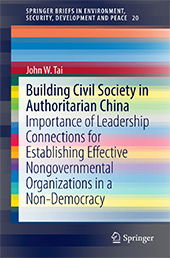|
|
| |
|
| |


SpringerBriefs in
Environment, Security, Development and Peace (ESDP)
A Peer Reviewed Book Series
Edited by
Hans Günter Brauch
Free University of Berlin and AFES-PRESS
 |
John W. Tai: Building Civil Society in Authoritarian China Importance of Leadership Connections for Establishing Effective Nongovernmental Organizations in a Non-Democracy. SpringerBriefs in Environment, Security, Development and Peace, Vol. 20 (Cham – Heidelberg – New York – Dordrecht – London: Springer-Verlag, 2015).
ISBN (Print): 978-3-319-03664-9
ISBN (Online/eBook): 978-3-319-03665-6
DOI: 10.1007/978-3-319-03665-6
Order Form
Order this book on the Springer Website
Order electronic version and individual chapters |
| |
|
About this book
- Presents new NGO cases for researchers on Chinese civil society in general and Chinese NGOs in particular
- Shows the relative importance of state linkage, media connections and international ties for Chinese NGOs
- Focuses on a detailed examination of Chinese NGOs that serve the country’s rural migrant population
- Offers valuable lessons on the NGO situation in China for NGO entrepreneurs, international donors and foreign government leaders
How is modern civil society created? There are few contemporary studies on this important question, and when it is addressed, scholars tend to emphasize the institutional environment that facilitates a modern civil society. However, there is a need for a new perspective on this issue. Contemporary China, where a modern civil society remains in a nascent stage, offers a valuable site to seek new answers. Through a comparative analysis of nongovernmental organizations (NGOs) in today’s China, this study shows the importance of the human factor, notably the NGO leadership, in the establishment of a modern civil society. In particular, in recognition of the social nature of NGOs, this study engages in a comparative examination of Chinese NGO leaders’ state linkage, media connections and international ties in order to better understand how each factor contributes to effective NGOs.
Content Level » Research
Keywords » China - Leadership Connections - Modern Civil Society - Nongovernmental Organizations - Rural Migrant Workers
Related subjects » Political Science - Social Sciences |
| |
|
On the Author |
 |
John W. Tai, Ph.D., is an adjunct professor at the George Washington University’s Elliott School of International Affairs and a consultant to the U.S. Government. John has written about China’s civil society, religious freedom and human rights in China, and US-China-Taiwan relations. He has also conducted public talks, private briefings, and media interviews on these subjects in both the United States and China. From 2007 to 2011, John taught at the Beijing Foreign Studies University and Shanghai's East China Normal University, where he managed study-abroad programs for American university students. Most recently, John authored a lengthy book review essay entitled “Civil Society: The Search Continues,” which appeared in the Fudan Journal of the Humanities and Social Sciences.
Address: John W. Tai, Ph.D., Elliott School of International Affairs, George Washington University, 1957 E Street, NW, Washington, DC 20052
Email: <johnctai2@gmail.com>
Website: http://www.linkedin.com/pub/john-w-tai/9/16a/4a |
| |
|
|
|